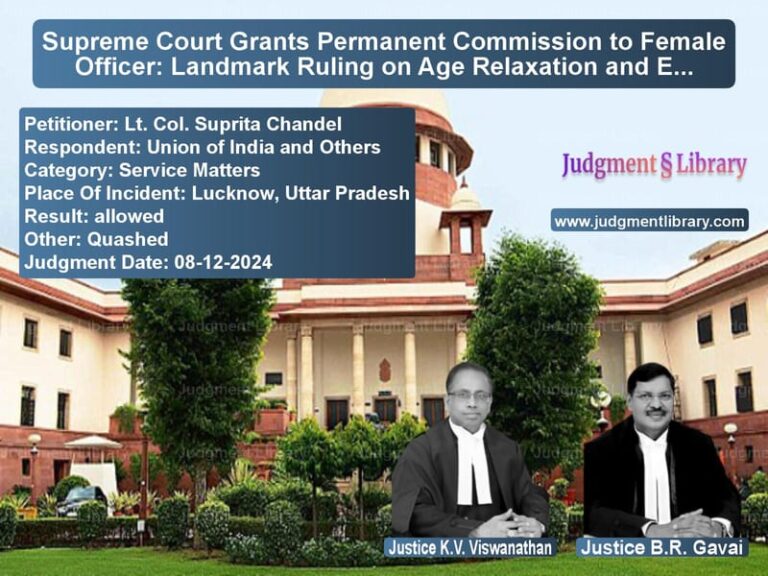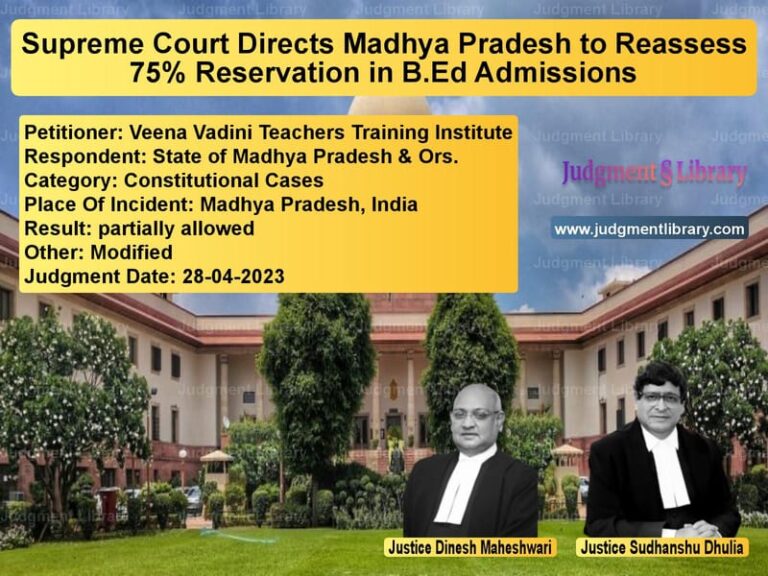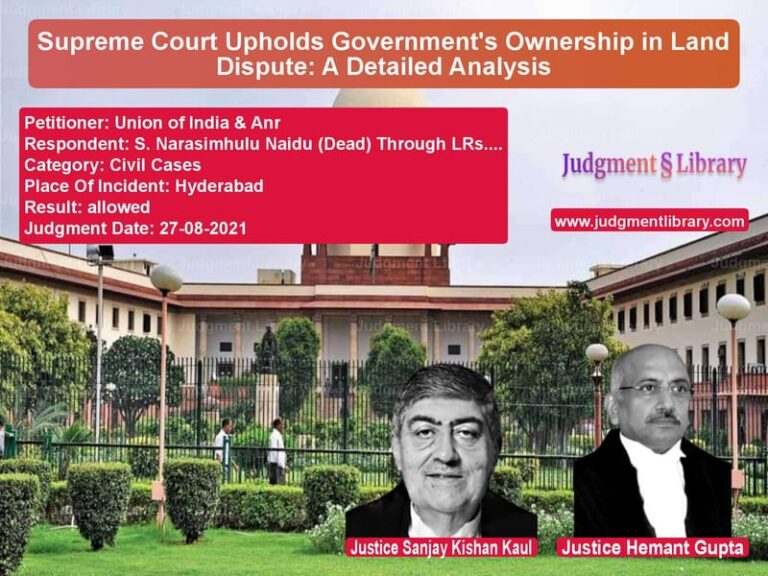Essential Commodities Act and Unauthorized Seizure: Supreme Court Acquits Appellants in Gas Cylinder Case
The case of Avtar Singh & Anr. v. State of Punjab revolves around the issue of unauthorized possession of gas cylinders under the Essential Commodities Act, 1955. The appellants were convicted under Section 7 of the Act for allegedly selling gas cylinders in black, violating the Liquefied Petroleum Gas (Regulation of Supply and Distribution) Order, 1988. The Supreme Court was called upon to determine whether the seizure and prosecution were legally valid.
The Supreme Court ultimately quashed the conviction, ruling that the seizure was unauthorized because the investigating officer lacked the statutory authority to take such action. This judgment serves as a crucial precedent regarding procedural compliance in cases involving essential commodities.
Background of the Case
The prosecution alleged that on February 26, 1995, a Sub-Inspector of Police received secret information that the appellants were selling gas cylinders illegally at Rs. 250 per cylinder instead of the government-prescribed rate of Rs. 102. Acting on this information, the police raided the location, seized the cylinders, and arrested the appellants.
The appellants were convicted by the trial court, which sentenced them to six months of imprisonment and a fine of Rs. 500 each. The Punjab and Haryana High Court upheld the conviction. The appellants then appealed to the Supreme Court.
Arguments by the Parties
Arguments by the Appellants (Avtar Singh & Anr.)
The appellants, represented by their legal counsel, argued:
- The seizure of gas cylinders was unauthorized as it was conducted by a Sub-Inspector of Police, who was not empowered under Clause 7 of the Liquefied Petroleum Gas (Regulation of Supply and Distribution) Order, 1988.
- Only an officer from the Food and Civil Supplies Department or a Sales Officer of an Oil Company was authorized to conduct such seizures.
- The case relied solely on the testimony of two police officers, and no independent witnesses or buyers supported the prosecution’s claims.
- The trial court and High Court failed to consider the procedural lapses, making the entire case against the appellants legally unsustainable.
Arguments by the Respondents (State of Punjab)
The State of Punjab defended the conviction, arguing:
- The appellants were found in unauthorized possession of gas cylinders and were engaging in black marketing, justifying their conviction.
- Even if the investigating officer was not specifically empowered under the law, the conviction should not be overturned on a mere technicality.
- The shortage of gas cylinders at the time necessitated strict action to curb illegal sales and black marketing.
Supreme Court’s Legal Analysis
Unauthorized Seizure and Clause 7 of the LPG Order, 1988
The Supreme Court analyzed Clause 7 of the Liquefied Petroleum Gas (Regulation of Supply and Distribution) Order, 1988, which specifies the officers authorized to seize LPG cylinders. The Court observed:
“The Order authorizes only officers of the Food and Civil Supplies Department, not below the rank of an Inspector, or a Sales Officer of an Oil Company to conduct searches and seizures. There is no provision allowing a Sub-Inspector of Police to undertake such action.”
The Court noted that the prosecution failed to provide any notification proving that the Sub-Inspector was specifically empowered by the government to act under the LPG Order.
Application of Procedural Fairness
The Supreme Court cited the principle established in Dharani Sugars and Chemicals Ltd. v. Union of India, which states:
“Where a power is given to do a certain thing in a certain way, it must be done in that way or not at all.”
Since the seizure was not conducted as per the prescribed procedure, the Court held that the prosecution was invalid from the outset.
Absence of Independent Witnesses
The Court noted that no independent witnesses testified to support the prosecution’s case. The only evidence presented was from the police officers who conducted the raid. The Court held:
“In cases where independent witnesses are available but not presented, it casts doubt on the credibility of the prosecution’s case.”
Final Judgment by the Supreme Court
The Supreme Court ruled:
- The seizure of gas cylinders was unauthorized as the investigating officer was not empowered under the law.
- The prosecution’s case was based solely on police testimony without independent corroboration.
- The conviction of the appellants under Section 7 of the Essential Commodities Act was quashed.
- The trial court’s and High Court’s judgments were set aside.
- The appellants were acquitted, and their bail bonds were discharged.
Impact of the Judgment
The Supreme Court’s ruling establishes important legal precedents:
- Only officers authorized under the relevant statutory provisions can conduct seizures and prosecutions.
- Failure to follow prescribed procedures renders criminal proceedings invalid.
- Independent witness testimony is crucial in cases involving allegations of black marketing.
- Courts must ensure procedural compliance to prevent wrongful convictions.
Conclusion
The Supreme Court’s decision in Avtar Singh & Anr. v. State of Punjab reinforces the importance of due process in criminal cases. It highlights that legal authorities must strictly adhere to statutory requirements when initiating criminal proceedings. By quashing the conviction, the Court reaffirmed that procedural fairness is a fundamental aspect of justice.
Petitioner Name: Avtar Singh & Anr..Respondent Name: State of Punjab.Judgment By: Justice Abhay S. Oka, Justice Rajesh Bindal.Place Of Incident: Punjab.Judgment Date: 22-03-2023.
Don’t miss out on the full details! Download the complete judgment in PDF format below and gain valuable insights instantly!
Download Judgment: avtar-singh-&-anr.-vs-state-of-punjab-supreme-court-of-india-judgment-dated-22-03-2023.pdf
Directly Download Judgment: Directly download this Judgment
See all petitions in Fraud and Forgery
See all petitions in Judgment by Abhay S. Oka
See all petitions in Judgment by Rajesh Bindal
See all petitions in allowed
See all petitions in Quashed
See all petitions in supreme court of India judgments March 2023
See all petitions in 2023 judgments
See all posts in Criminal Cases Category
See all allowed petitions in Criminal Cases Category
See all Dismissed petitions in Criminal Cases Category
See all partially allowed petitions in Criminal Cases Category







